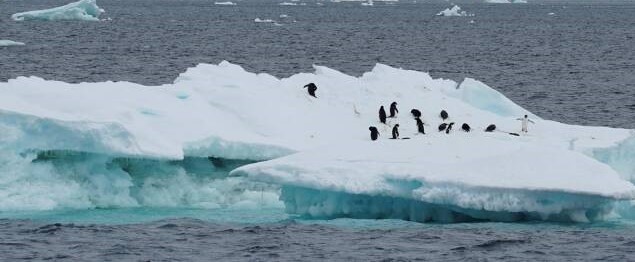MELTING ANTARCTIC ICE AND FLOW OF OCEAN WATER

Disclaimer: Copyright infringement not intended.
Context
- Rapidly melting Antarctic ice is dramatically slowing down the flow of water through the world’s oceans, and could have a disastrous impact on global climate, the marine food chain and even the stability of ice shelves, new research has found.
Decoding the concepts
Overturning circulation
- The “overturning circulation” of the oceans, driven by the movement of denser water towards the sea floor, helps deliver heat, carbon, oxygen and vital nutrients around the globe.
- Ocean overturning allows nutrients to rise up from the bottom, with the Southern Ocean supporting about three-quarters of global phytoplankton production, the base of the food chain.
Atlantic Meridional Overturning Circulation (AMOC)
- The AMOC is a large system of ocean currents.
- It is the Atlantic branch of the ocean conveyor belt or Thermohaline circulation (THC), and distributes heat and nutrients throughout the world’s ocean basins.
- AMOC carries warm surface waters from the tropics towards the Northern Hemisphere, where it cools and sinks.
- It then returns to the tropics and then to the South Atlantic as a bottom current. From there it is distributed to all ocean basins via the Antarctic circumpolar current.
Highlights of the study
- Deep ocean water flows from the Antarctic could decline by 40% by 2050.
- As temperatures rise, freshwater from Antarctica’s melting ice enters the ocean, reducing the salinity and density of the surface water and diminishing that downward flow to the sea’s bottom.
- A past research has looked at what could happen to similar overturning circulation in the North Atlantic.
- If we slow the sinking near Antarctica, we slow down the whole circulation and so we also reduce the amount of nutrients that get returned from the deep ocean back up to the surface.
- The study’s findings also suggest the ocean would not be able to absorb as much carbon dioxide as its upper layers become more stratified, leaving more CO2 in the atmosphere.
Must Read Articles:
Changing Antarctica Weather Pattern: https://www.iasgyan.in/daily-current-affairs/changing-antarctica-weather-pattern
|
PRACTICE QUESTION Q) Discuss the impact of melting Antarctic ice on the flow of water through the world’s oceans. (250 words) |





1.png)
